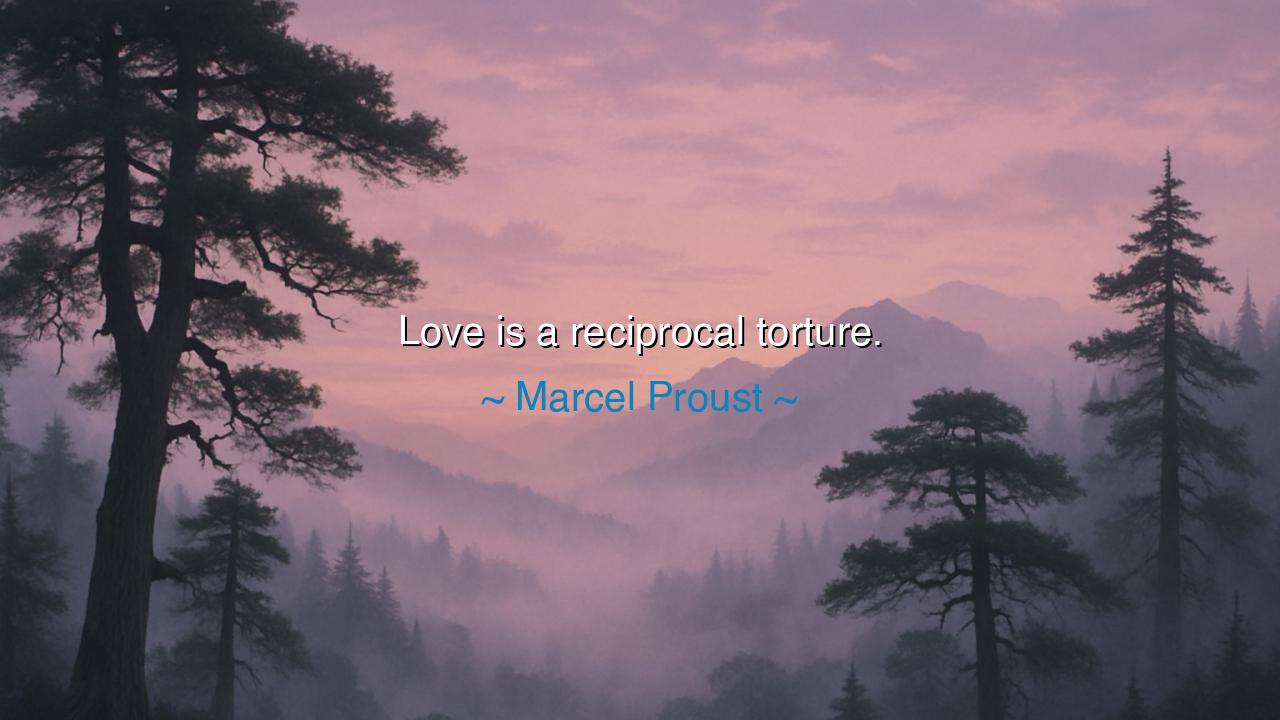
Love is a reciprocal torture.






“Love is a reciprocal torture.” — Thus spoke Marcel Proust, the great cartographer of the human heart, whose pen traced the hidden pathways of desire and memory. In this brief but piercing thought, Proust laid bare one of the most haunting truths about love — that it is not only sweetness and light, but also a mirror of our most exquisite pain. Love, he tells us, is a bond of two souls who both long and suffer, each vulnerable to the other, each capable of both ecstasy and torment. It is reciprocal, for the torment is shared, and torture, for it arises from the very intensity of affection itself.
To understand this saying, we must first know the man who wrote it. Proust, the author of In Search of Lost Time, lived not as a conqueror of life’s passions but as their observer, a pilgrim through the labyrinth of feeling. He spent his life seeking to capture the delicate truths that most hearts hide from themselves. To him, love was not a simple union of harmony, but a drama of longing and uncertainty — a struggle between the desire to possess and the fear of loss. He saw that to love deeply is to surrender control, to place one’s peace in the hands of another. And thus, the very thing that exalts us — love — also makes us fragile, exposed to the anguish of doubt, jealousy, and unmet desire.
When Proust calls love a reciprocal torture, he means that the agony of love is not one-sided. In its purest and most human form, both lovers suffer: each desires to be loved as much as they love; each fears that the other’s heart may wander, that their devotion may fade. This fear — often unspoken — lies coiled beneath every passionate attachment. One soul burns to be assured, the other trembles to be enough. Love becomes a circle of yearning, where joy and pain feed upon each other. And yet, paradoxically, it is this very vulnerability that gives love its depth. Without the risk of pain, love would be shallow — a comfort, perhaps, but not a revelation.
We see this truth echo through history and art. Think of Antony and Cleopatra, whose love blazed so fiercely that it consumed the world around them. Their passion united them, yet also destroyed them, for it chained them to each other’s fate. In their ecstasy lay their ruin, and in their ruin, their immortality. Or consider Proust’s own lovers, like Swann and Odette, whose relationship he describes as both rapture and torment. Swann’s love becomes a sickness, his happiness dependent on every glance, every word from the woman he adores. He cannot live without her, yet he cannot find peace with her. Thus, love becomes both the balm and the wound.
But Proust’s insight is not one of despair — it is a revelation. He reminds us that love’s pain is not proof of its failure, but of its intensity. To love another is to step into the unknown, to accept the risk of heartbreak in exchange for the miracle of connection. The soul that loves does not live safely; it lives fully. For in the crucible of love, we are stripped of illusion — we learn humility, patience, compassion. The torture is real, but it purifies the heart, making it capable of something higher than desire: the understanding that love is not possession, but recognition.
There is wisdom, too, in seeing that love’s suffering is mutual. When we remember that the one we love is also afraid, also yearning, also vulnerable, our hearts soften. The “reciprocal torture” becomes not a battlefield, but a communion. We learn to forgive the failings of the other, knowing that they arise from the same human frailty that haunts us. Love then transforms from a prison into a pilgrimage — a journey of two souls learning, through pain and tenderness alike, what it means to truly see one another.
Therefore, dear seeker, take this lesson from Proust’s sorrowful beauty: do not flee love because it wounds you, and do not mistake suffering for failure. To love is to open oneself to the risk of heartbreak, but also to the possibility of transcendence. When love hurts, it is not punishment — it is proof that your heart is alive. Love deeply, but wisely; desire passionately, but gently. Let your affection be fierce, yet free. For though love may be a reciprocal torture, it is also the fire that refines the soul — the crucible in which we become truly human.
Thus, remember this: the pain of love is not its enemy, but its teacher. It humbles, purifies, and awakens us to the truth that joy and sorrow are woven from the same thread. To endure that paradox is to live bravely — to taste both the agony and the glory of the heart’s highest calling. And though love may never save us from suffering, it redeems the suffering itself, turning pain into meaning and desire into grace.






AAdministratorAdministrator
Welcome, honored guests. Please leave a comment, we will respond soon